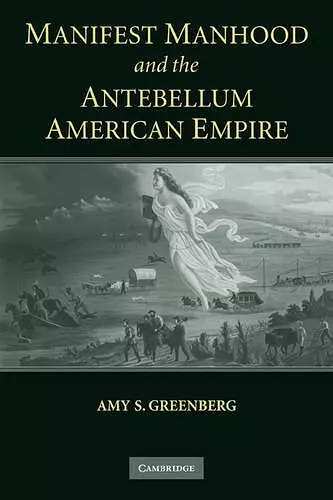Manifest Manhood and the Antebellum American Empire
Format:Paperback
Publisher:Cambridge University Press
Published:6th Jun '05
Currently unavailable, and unfortunately no date known when it will be back
This paperback is available in another edition too:
- Hardback£75.00(9780521840965)

This book documents the potency of Manifest destiny in the antebellum era.
This book documents the potency of Manifest destiny in the antebellum era, and situates imperial lust in the context of social and economic transformations that were changing the meaning of manhood and womanhood in the United States.The US-Mexico War (1846–8) brought two centuries of dramatic territorial expansionism to a close, seemingly fulfilling America's Manifest destiny. Or did it? As politicians schemed to annex new lands in Latin America and the Pacific, some Americans took expansionism into their own hands. From 1848–60, an epidemic of unsanctioned attacks by American mercenaries (filibusters) took place. This book documents the potency of Manifest destiny in the antebellum era, and situates imperial lust in the context of social and economic transformations that were changing the meaning of manhood and womanhood in the US. Easy victory over Mexico in 1848 led many American men to embrace both an aggressive vision of expansionism and an equally martial vision of manhood. Debates about the propriety of aggression abroad polarized the public at home, shaping antebellum Presidential elections, foreign policies, gender relations, and ultimately the failure of sectional compromise before the Civil War.
"Amy Greenberg's fascinating account casts new light on Manifest Destiny expansionism by showing how martial conceptions of manhood animated the enthusiasm for territorial annexation in the 1850s. Filibustering, she finds, stemmed not only from economic and political ambitions but from widespread male desires for adventure and romance. Although more restrained visions of manhood also influenced expansionist ambitions, particularly in Hawaii, Greenberg demonstrates that aggressive conceptions of manhood shaped foreign relations long before Theodore Roosevelt rallied the Rough Riders." -Kristin Hoganson, University of Illinois, Urbana-Champaign
"In this thoughtfully constructed and informative book, Greenberg develops a highly original thesis about American territorial expansionism and destroys the common wisdom that Manifest Destiny was in its death throes by the Civil War. Providing the most penetrating analysis, to date, of filibustering's ramifications for U.S. culture, Greenberg convincingly highlights the significance of gendered images, arguments, and ambitions within imperialist and anti-imperialist discourse alike. This book, in engaging prose richly informed by theory but refreshingly free of jargon, makes use of a treasure of source material, especially travel accounts and magazine pieces and convincingly illuminates hitherto unexplored connections between filibustering abroad and urban life at home, while also connecting U.S. military aggression against Latin America with America's imperial record in the Pacific. This is an insightful and provocative take on nineteenth-century American aggression overseas that has implications for the nation's modern plight abroad." -Robert May, Purdue University
"This work is a gender study of American expansionism during the period from 1848 to 1860." -Antonio Rafael de la Cova, The Register of the Kentucky Historical Society
"...a fine book that will be useful in many contexts." -Mark Jaede, Journal of the Early Republic
ISBN: 9780521600804
Dimensions: 229mm x 152mm x 23mm
Weight: 540g
344 pages